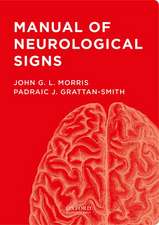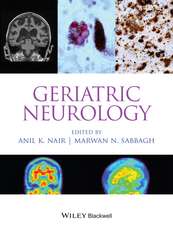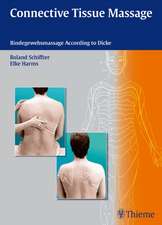Impact of Cardiac Surgery on the Quality of Life: Neurological and Psychological Aspects
Editat de G. Rodewald, A.E. Willneren Limba Engleză Paperback – 6 oct 2011
Preț: 380.61 lei
Preț vechi: 400.65 lei
-5% Nou
Puncte Express: 571
Preț estimativ în valută:
72.83€ • 76.24$ • 60.26£
72.83€ • 76.24$ • 60.26£
Carte tipărită la comandă
Livrare economică 05-19 aprilie
Preluare comenzi: 021 569.72.76
Specificații
ISBN-13: 9781461279082
ISBN-10: 1461279089
Pagini: 540
Ilustrații: 566 p.
Dimensiuni: 152 x 229 x 28 mm
Greutate: 0.71 kg
Ediția:Softcover reprint of the original 1st ed. 1990
Editura: Springer Us
Colecția Springer
Locul publicării:New York, NY, United States
ISBN-10: 1461279089
Pagini: 540
Ilustrații: 566 p.
Dimensiuni: 152 x 229 x 28 mm
Greutate: 0.71 kg
Ediția:Softcover reprint of the original 1st ed. 1990
Editura: Springer Us
Colecția Springer
Locul publicării:New York, NY, United States
Public țintă
ResearchCuprins
Psychiatric Issues.- Methods — Construction and Clinical Application of the Hamburg Rating Scale for Psychic Disturbances (HRPD).- Psychiatric Methods of the International Study: Hamilton Depression and Anxiety Scales.- Psychiatric Issues: Simple Frequencies Pre- and Postoperatively.- Fantasies Evoked by Cardiac Surgery.- The Evaluation of the Emotional Climate in the Families of Cardiac Surgery Patients.- Psychologic Sequelae of Cardiac Valve Implantation.- What Do Patients With Incomplete Postoperative Data Tell Us? The Problem of Fatal Outcome and Refusing Postoperative Testing: Psychiatric Aspects.- Psychological Adaptation of Patients 3 to 5 Years After Heart Surgery.- An Interpretive Study of the Metaphors Male Coronary Artery Surgery Patients Use to Describe the Surgical Experience.- Good Psychosocial Adaptation to Implantable Cardioverter Defibrillators.- Denial Among Cardiac Patients With the Automatic Implantable Cardioverter Defibrillator.- Neurological Issues.- The Susceptibility of the Central Nervous System to Open Heart Surgery.- Neurological Assessment of Early Cerebral Outcome After Coronary Bypass Surgery.- Automatic EEG Monitoring in Cardiac Surgery.- Magnetic Resonance Imaging of the Brain in Infants and Children Before and After Cardiac Surgery: A Prospective Study.- Cerebral Dysfunction in Elective Coronary Surgery.- Cerebral Blood Flow Regulation During Cardiopulmonary Bypass: Correlation With Postoperative Neurologic and Neuropsychologic Deficits.- Electroencephalogram-Based Prognosis of Cardiac Surgery — A Long-Term Follow-Up Study.- Psychometric Issues.- The Use of Cognitive Tests to Assess Cognitive Impairment in Cardiac Surgery Patients: With Emphasis on the CLAT Analogy Test.- Changes in Psychometric Test Scores After Cardiac Surgery.-The Persistence of Neuropsychological Deficits Twelve Months After Coronary Artery Bypass Surgery.- Neuropsychological Functioning Following Cardiopulmonary Bypass.- Reports of Cognitive Change, Mood State and Assessed Cognition Following Coronary Artery Bypass Surgery.- Memory Functioning After Cardiac Surgery With Cardiopulmonary Bypass: Comparisons Between Heart and Back Patients.- Neuropsychological Findings and Personality Structure Associated With Coronary Artery Bypass Surgery (CABS): An Eight Month Follow-Up Study.- Predicting Memory Outcome From Medical Variables After Cardiac Surgery With Cardiopulmonary Bypass.- Neuropsychological Impairment in Candidates for Cardiac Transplantation.- Medical/Surgical Data.- The Surgeon’s Description of the Patient Population.- A Study of Equipment for and Performance of Extracorporeal Circulation.- Cerebral Protection During Cardiopulmonary Bypass: Devices and Techniques to Prevent Air Embolism.- Cerebral Blood Flow Declines Independently of Metabolism During Hypothermic Cardiopulmonary Bypass.- Emission of Micro-Bubbles in Bubble (BO) and Membrane-Oxygenators (MO): A Comparative Investigation.- Comparison of In-Hospital Conditions for “International Study” and “Non-Study” Patients.- Weight Gain and the Development of Sleep Apnea Following Heart Transplantation.- Correlations between Medical/Surgical Data and Postoperative Psychiatric, Neurological And Psychometric Condition.- Demographics of the Multi-Center Sample.- Type of Oxygenator, Type of Arterial Filter, and Bypass Time, in Relation to Outcome.- Several Parameters of Extracorporeal Circulation and Outcome.- Anesthesia and Psychometric Tests — Problems in Psychological Assessment of Cognitive Recovery After Anesthesia.- Arterial Line Filtration ReducesMicroembolism and Significantly Improves Neuropsychological Outcome in Coronary Artery Surgery.- Cerebral Microembolism and Neuropsychological Outcome Following Coronary Artery Bypass Surgery (CABS) With Either a Membrane or Bubble Oxygenator.- EEG Monitoring During Cardiopulmonary Bypass Procedures.- Success of the Low Flow — Low Pressure Perfusion in Reducing Postoperative Psychological Disturbances.- Review: Medical and Surgical Data.- Correlations between Psychiatric, Neurological and Psychometric Variables.- Correlations Between Psychiatric, Neurological and Psychometric Variables: Psychiatric and Psychometric Issues.- Correlations Between Psychiatric and Neurological Findings.- The Correlations Between Neurological and Neuropsychological Variables.- Prediction and Postoperative Outcome.- Can One Predict the Patient’s Postoperative Psychiatric and Neurological Condition?.- Psychodynamic Prediction of Postoperative Mental Vulnerability.- The Relevance of Health Related Cognitions and Attitudes For the Prediction of Surgical Outcome.- The Relationship of Preoperative Anxiety and Postoperative Complications in Patients Having Open Heart Surgery.- Quality Of Life.- Quality of Life of Finnish Heart Surgery Patients Related to Results From Preoperative and Follow-Up Examinations.- Beck Depression Inventory Scores of Coronary Bypass Patients With and Without Psychological Intervention.- Quality of Life After Open Heart Surgery.- Quality of Life After Cardiac Surgery: Social and Environmental Aspects.- Quality of Life and Coping in Heart Transplant Recipients.- Development of a Construct of Psychological Dependency in Patients With the Automatic Implantable Cardioverter Defibrillator: A Quality of Life Issue.- Quality of Life Issues and Psychological TreatmentStrategies Affecting Coronary Artery Disease During Convalescence and Rehabilitation.









